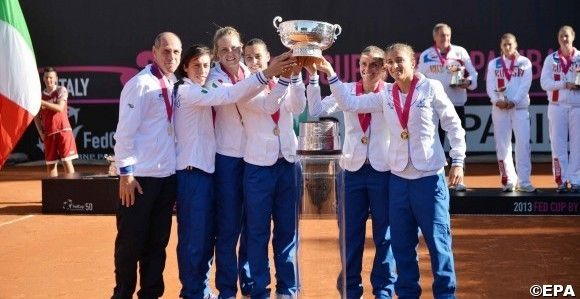Friendship Was Key To Italian Success
 Friendship Was Key To Italian Success
Friendship Was Key To Italian Successepa03934550 (L-R) Italy's team Captain Corrado Barazzutti and players Francesca Schiavone, Karin Knapp, Flavia Pennetta, Roberta Vinci and Sara Errani raise the cup after winning against Russia the Fed Cup final in Cagliari, Italy, 03 November 2013. EPA/ROBERTO TRONCI |
Italy’s fourth Fed Cup title was achieved a number of ways in a sometimes-trying year for the southern European nation, but the team hung together, which keyed their wins in all three ties they contested.
“The players have the right spirit,” said Italian Fed Cup captain Corrado Barazzutti after his team shut out Russia in Cagliari. “The girls like to play for their country, they like to play on the team and they like each other. They are friends, they support each other and that’s the secret to the win Fed Cup.”
The team that Russia brought to the final was disjointed as captain Shamil Tarpischev couldn’t get any of his top 11 players to show up. Some were injured, others were not asked and others simply declined to play.
Russia nearly scratched its way into the tie in the opening match when world No. 136 Alexandra Panova, held four match points in her three hour plus 5-7, 7-5, 8-6 loss to Roberta Vinci, but she could not pull thorough. Tarpischev’s strategic maneuvering then lost much of its value as 18-year-old Irena Khromacheva went down to the more experienced and excellent clay courter Sara Errani. Tarpischev subbed in Alisa Kleybanova for Panova the next day, but the cancer survivor admitted that she isn’t ready for prime time and Errani took her out in less than an hour 6-1 6-1 to clinch the tie.
“I can’t say I was playing my best but even if I did it will still be extremely tough to do a lot more,” Kleybanova said. “If I would have played just for myself in a singles tournament, maybe would go for more risk, but it’s tough in Fed Cup. I haven’t played it in a long time and I haven’t played on clay court for long time. Too many things were happening at the same time.”
Tarpischev came under intense criticism for being unable to recruit even a “B” level team, but there were some circumstances beyond his control. His three top players —
Maria Sharapova, Maria Kirilenko and Ekaterina Makarova– were all hurt. Two of his best veterans, Svetlana Kuznetsova and Nadia Petrova, opted out, Kuznetsova because she doesn’t see eye to eye with him on a number of issues and Petrova because she feels like she is close to retirement and doesn’t want to risk further injury.
However, two of his younger mainstays from this year’s squad, Anastasia Pavlyuchenkova and Elena Vesnina, instead chose to play the Tournament of Champions in Sofia. Neither reached the finals.
Tarpischev blamed his failure to recruit his top players partly on a lack of money that all Soviet sports face due to a struggling economy, so he is unable to pay them what they are worth. He also mentioned that the WTA holding its Tournament of Champions in Sofia during the same week hurt.
Fed Cup will move back a week next year so it will not conflict with any other event.
Barazzutti admitted that facing what should have been a powerhouse Russian squad and then having to best an underwhelming squad was strange, but he added that sometimes it’s more difficult to win when a team is expected to, and also noted that that the team’s quarterfinal win over the US and its semifinal victory over the two-time defending champs Czechs were very tough
“Maybe in this final was very strange one because we didn’t play against the best players of Russia, but it was very tough to play in this condition because everyone was waiting for the victory and we had to play very concentrated because we were scared a little,” he said. “If you see the final, maybe it looks more easy, but the US played better than we expected and we beat the No. 1 team in the world in Czech Republic when Roberta played unbelievable. Sometimes Fed Cup can be easy and sometimes not, but the important thing is to win when you have a chance to win.”
Topics: 10sballs, Alexandra Panova, Alisa Kleybanova, Ekaterina Makarova, Elena Vesnina, Fed Cup, Maria Kirilenko, Maria Sharapova, Nadia Petrova, Roberta Vinci, Sports, Tennis, Tennis News


10sBalls Top Stories
- Reasons Behind the Increase in Sex Shops
- Reasons Behind the Increase in Sex Shops
- Reasons Behind the Increase in Sex Shops
- Casibom: Yaşayan Casinolar ve Bahisler Lider Platform
- Sea Star Casino: Play Games Without Registering Online
- JETZT DEN SWEET BONANZA SLOT GRATIS DREHEN
- Азартные игры с Мостбет Казино – испытайте удачу
- Çevrimiçi en iyi yuvalar: Hizmetinizde Karavan Bet Casino
- Top No Deposit Free Spins Offer for Canadians – December 2024
- Abe Bet Casino: Ücretsiz dönüşlerle heyecan hissedin
- Ünlü slotlar çevrimiçi kumarhanelerde başarı bet giriş ücretli formatta
- BasariBet Casino Giriş – En Güzel Canlı Casino Oyunlarına Katılın
- Игра на деньги в казино 1вин казино: безопасность
- De parking de credits sans oublier les Diction Casino Archive sauf que Perception
- Играть в хитовые слоты в надежных клубах azino777





